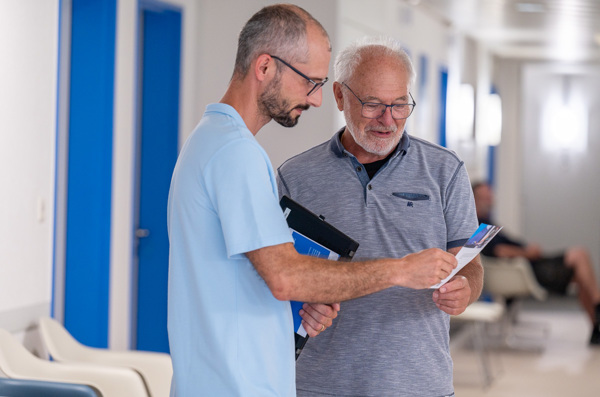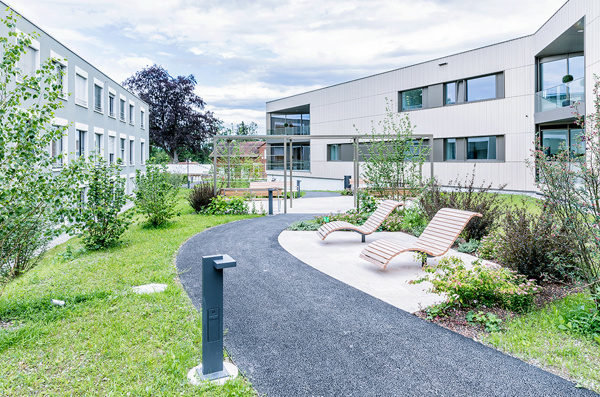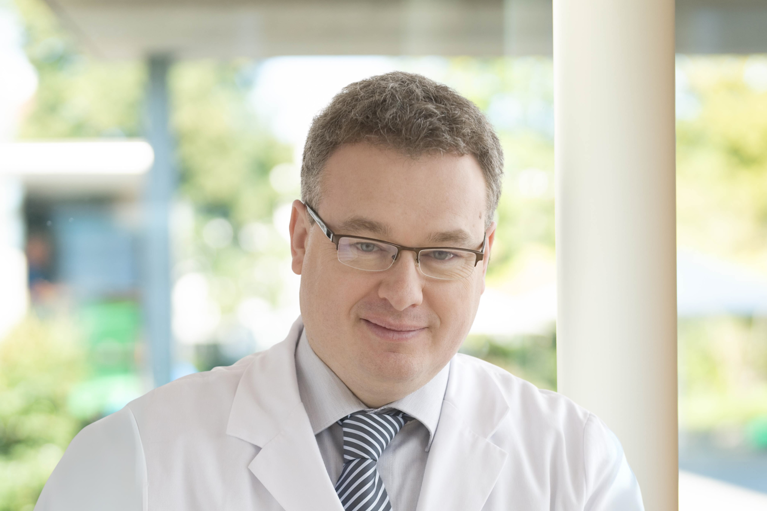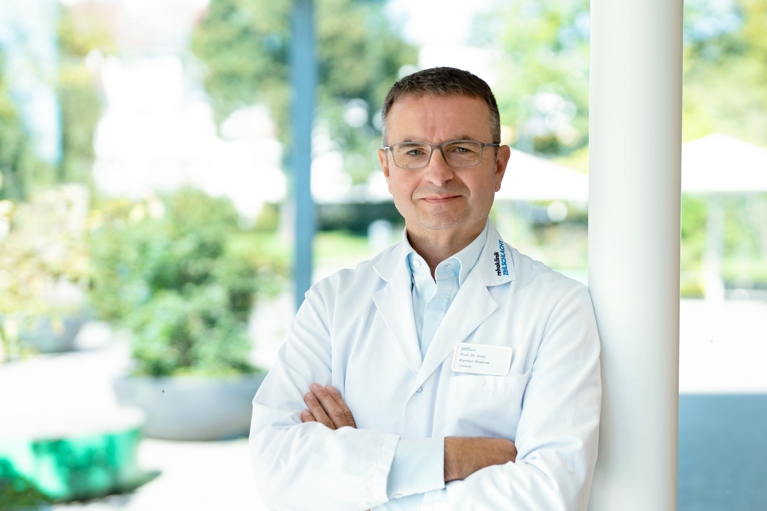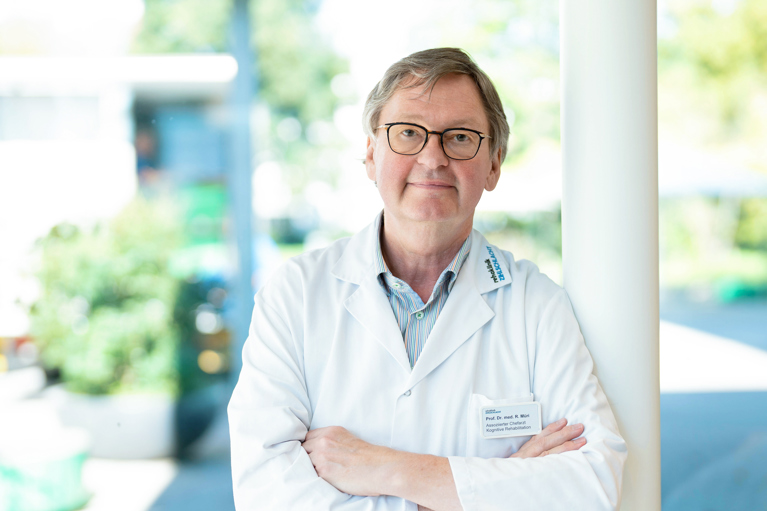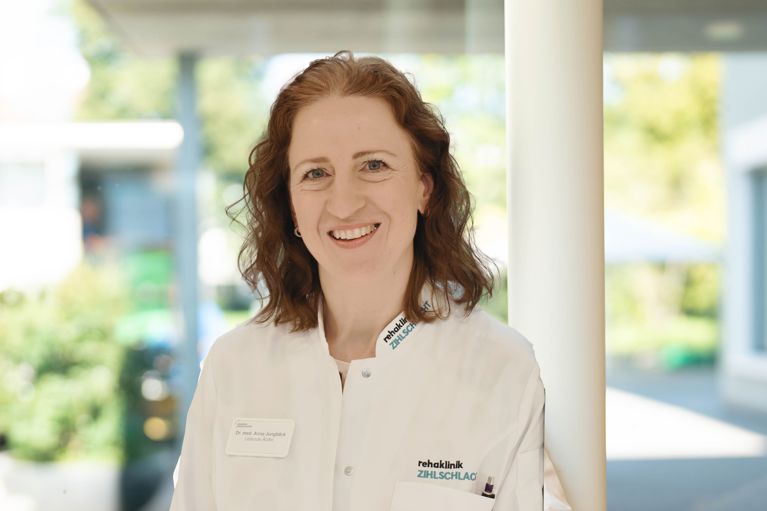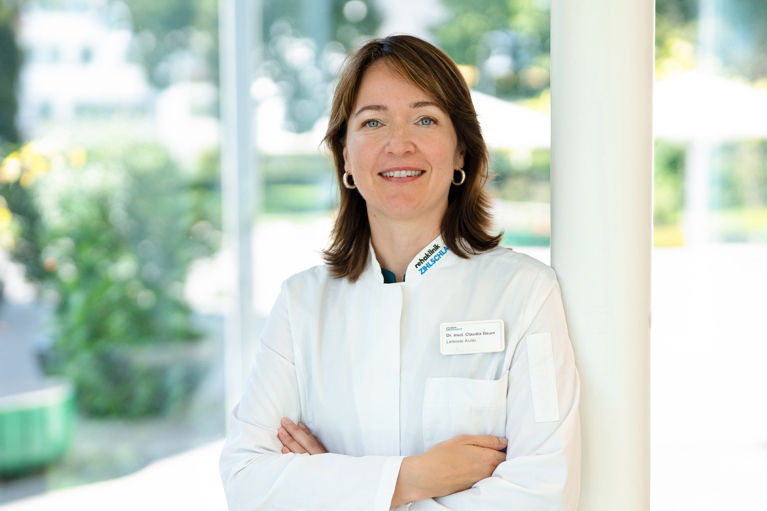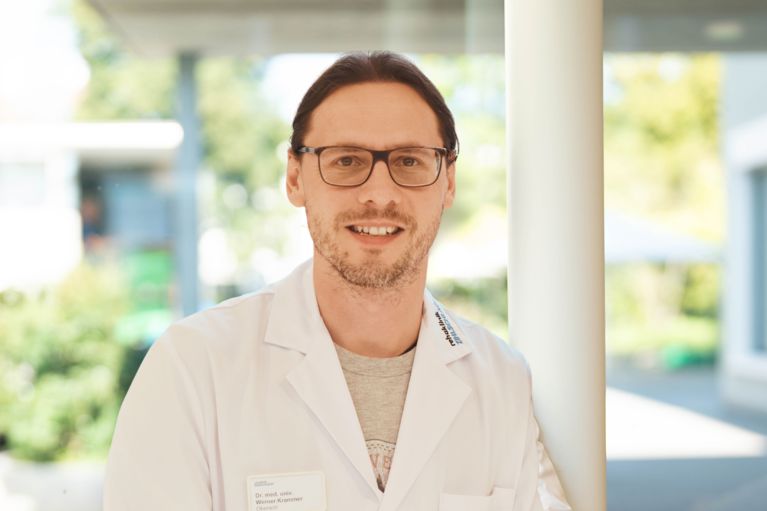

Neurological rehabilitation
The human nervous system, with its billions of connections, is a fascinating and highly complex system. Each of our activities, be it thinking, feeling, dreaming, speaking, sensory perception, voluntary movements or automatic vegetative processes, are controlled by our nerves. Therefore, if damage occurs as a result of an accident or a neurological disease, the symptoms can emerge in very different ways and in various combinations. The Rehaklinik Zihlschlacht has been specializing in neurological rehabilitation since it was founded and offers numerous specific services following an individual assessment.
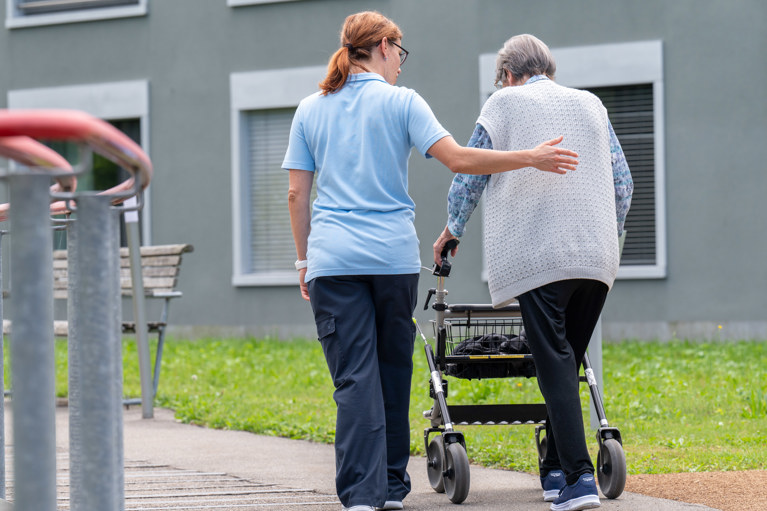
We help people regain their normal function and independence
- after a stroke
- after accidents with traumatic brain injury
- with Parkinson's disease
- with multiple sclerosis
- after brain and nerve inflammation
- with Long Covid
-
Decreased alertness and impaired consciousness: brain injuries can be so severe that, in addition to paralysis and other symptoms of neurological system failure, there may also be disturbances of alertness and consciousness.
The term coma is used when a patient cannot be awakened from a state similar to permanent sleep. In a waking coma, the patient is awake with their eyes open, but no intentional brain activity is detectable and their perception of the environment appears severely restricted.
-
Thinking, concentration, memory: Thinking, concentration, memory and other cognitive functions can be impaired in the event of a brain disease or injury. These disorders are not always noticed by patients themselves. This also applies in particular to attention disorders in the sense of neglect. As for cognitive disorders, they may have a major impact on individual’s coping with everyday life and work.
-
Neurological visual disorders: Neurological visual disorders occur quite frequently when the brain is damaged. Visual problems are particularly common after strokes, traumatic brain injury and multiple sclerosis. Double vision and visual field defects can occur, which may have an unfavourable effect on the course of rehabilitation. For example, it can be difficult for a patient to learn to walk again if they cannot see well.
-
Speech & language: Especially after strokes, speech functions (aphasia: speaking, language comprehension, reading and writing skills) and voice production (dysarthria) may be impaired. Patients in this situation may no longer be able to communicate with those around them.
-
Swallowing disorders: Swallowing disorders (dysphagia) are particularly common at the early stages after neurological events such as strokes or traumatic brain injury and as a result of various progressive neurological diseases such as Parkinson's or multiple sclerosis. The major risk of swallowing disorders is the development of aspiration pneumonia, i.e. inflammation of the lungs caused by liquids and food entering the airways.
-
Paralysis of the arms and legs: Paralysis of the arms and legs is one of the most common symptoms of neurological diseases and usually occurs as hemiparesis in the case of brain damage, or as paralysis of both legs (paraparesis) or all extremities (tetraparesis) in the case of spinal cord injuries. Paralysis has a major impact on the independence in activities of daily living: eating, personal hygiene, dressing, writing or standing and walking may be impaired or impossible.
-
Spasticity: As a counter-reaction of the body to paralysis, increased muscle tension can develop, which can be so pronounced that it itself may become the main health problem and additionally restrict the patient in the use of their arms and hands as well as when walking.
-
Sensory disorders (sensitivity) and pain: Neurological diseases can lead to sensory disorders, accompanying or independent of symptoms of paralysis, for example in the sense of numbness in parts of the face, arms or legs. Pain can have an even more unpleasant and restrictive effect. The treatment of chronic neurological, i.e. neuropathic, pain can prove to be very lengthy.
-
Walking & balance disorders: Mobility restrictions can occur due to paralysis, sensory disorders, coordination disorders or a combination of several disorders.
-
Continence problems, sexual dysfunction: The control of urine and/or bowel movements can be impaired, particularly in the case of spinal cord damage, but also in the case of brain damage, after prolonged bedriddenness or after prolonged treatment with an indwelling urinary catheter. This can be a major burden for a patient, their caregiver or relatives in everyday life. The causes of sexual dysfunction in connection with neurological diseases can vary greatly. However, these problems should also be addressed openly, as in most cases there is the possibility of successful recovery.
-
Neurological sleep disorders: Sleep disorders can have a whole range of psychological or physical causes. A distinction is made between the most common insomnia and an increased need for sleep and a tendency to fall asleep (hypersomnia). Disorders of the sleep-wake rhythm are also common. Sleep problems can be triggered and exacerbated by neurological disorders. The treatment of sleep problems is very important in everyday life. Dealing with them is important for the rehabilitation outcomes, as a well-rested patient achieves better results.
-
Disturbance of alertness and consciousness: Therapy is carried out by a multi-professional team, which uses motor and sensory stimulation methods as well as medications. A special auditory stimulation method is music therapy, as musical sensations are very deeply rooted in our brain. Robotics, on the other hand, is an important aid for mobilization and verticalisation.
-
Neurological sleep disorders: In addition to medication, which should not be given on a long-term basis, if possible, consultations with neuropsychologists and doctors on sleeping habits and relaxation techniques such as progressive muscle relaxation or QiGong are key to treatment.
-
Thinking, concentration, memory: our neuropsychologists examine the individual’s brain functions and initiate specific therapies. In occupational therapy, the specific requirements and difficulties in the workplace are analysed and practiced in a targeted manner.
In most cases, brain performance can be significantly improved through targeted intensive therapies and the learning of strategies.
-
Neurological visual disorders: The Rehaklinik Zihlschlacht has specialized in the rehabilitation of neurological visual disorders with its own orthoptics unit and has developed its own therapy concepts. The internationally renowned specialist in neuro-ophthalmology, Prof. R. Müri from the University of Bern, advises us as a consultant. For ophthalmological vision problems that are not directly related to a neurological condition, we collaborate with the Wil Eye Center (Dr. med. Juliane Döpfner). These therapies can be provided on an outpatient or inpatient basis.
-
Speech & language: The treatment of so-called aphasia (speech disorders) and dysarthria (speech disorders) is administered as part of intensive speech therapy.
Although these types of problems are sometimes difficult and lengthy to treat, in the vast majority of cases improvements can be made and communication sufficient for everyday life can be achieved. This goal can be achieved with the active involvement of the patient’s relatives, and in some cases aids such as speech computers can also be useful.
-
Swallowing disorders: Temporary feeding tubes such as nasogastric or PEG tubes are used to ensure continued nutrition.
Some patients in rehabilitation were fitted with a tracheostomy tube while still in intensive care in order to maintain breathing and keep the airways clean by suctioning. Specialized speech therapists, nurses, doctors and nutritionists work together to gradually wean patients off feeding tubes and tracheostomy tubes. This makes normal breathing and food intake possible again.
-
Paralysis of the arms and legs: As a general rule, the earlier and more intensive the therapies are started after an event, the better the prognosis. For this reason, physiotherapy and occupational therapy at the Rehaklinik Zihlschlacht are provided using intelligent therapy devices, known as robotics, in addition to conventional therapies. With these devices, patients can be mobilized from their hospital bed earlier after an event and the intensity of therapies can be increased by up to a factor of 10. The Rehaklinik Zihlschlacht is a pioneer in the clinical application of therapeutic robot-assisted devices and has one of the largest robotics centers in Europe.
-
Spasticity: An improvement in spasticity can often only be achieved through the cooperation of a specialized spasticity team. The team consists of doctors and specialists in physiotherapy, occupational therapy and physical medicine. The Rehaklinik Zihlschlacht can also use the advice of an experienced consultant in neuro-orthopaedics, Dr. F. Gebhard.
A proven treatment method for spasticity is botulinum toxin injections, which are administered by a specialized team at the Rehaklinik Zihlschlacht.
-
Sensory disturbances (sensitivity) and pain: The administration of medication for neuropathic pain in such a situation is usually only part of a multidisciplinary treatment involving specialized physiotherapy, physical medicine, psychology, traditional Chinese medicine (TCM), specialized physicians (neurologists, psychiatrists) and relaxation techniques such as QiGong.
-
Continence problems, sexual dysfunction: With targeted bladder training or bowel movement training, persistent incontinence, i.e. the loss of urine or stool, can be prevented in most cases. In addition to specialized care, a trained urology therapist helps patients deal with these problems. The urology team is supported by Dr. J. Johannsen, Senior Consultant in Urology at Münsterlingen Cantonal Hospital, who offers regular consultations at the clinic.
- Walking and balance disorders: In addition to conventional physiotherapy, the targeted use of robotics can make an important contribution to regaining mobility. Therapies such as exercise baths or equine-assisted therapy can also be used.
Thanks to interdisciplinary care provided by our experienced specialists, nursing staff, psychologists, physiotherapists, occupational therapists and nutritionists, we can offer you holistic therapy tailored to your needs.
A variety of different therapies can be utilized, with a focus on those scientifically proven to be effective (evidence-based therapies).
Innovative therapy methods are used as soon as they promise an advantage over conventional therapies, for example in the fields of robotics, computer-assisted rehabilitation or neuromodulation, such as transcranial magnetic stimulation (TMS). It is a modern therapy method in which the brain is stimulated by means of a magnetic field. TMS makes it possible to reduce the imbalance between the damaged and intact hemispheres of the brain following a brain injury such as a stroke. This can improve the so-called neuroplasticity, which is important for the recovery of neurological deficits.
TMS is a non-invasive additional therapy used together with the usual therapies. The treatment is painless and the stimulation lasts just under a minute. It is administered four times a day, on two consecutive days.
At the Rehaklinik Zihlschlacht, it is used for patients with a so-called spatial neglect, a disorder of spatial attention.
The Rehaklinik Zihlschlacht offers the most effective diagnostic tests in the field of neurology, such as neurophysiological examinations (electroencephalography, evoked potentials, electroneurography, electromyography), ultrasound procedures (Doppler and duplex sonography) and X-rays.
Another focus is diagnosing swallowing disorders using fiber endoscopic swallowing examinations (FEES), which are carried out by our speech therapists, specially trained doctors and in collaboration with our consultant physician, Dr. P. Diesener.
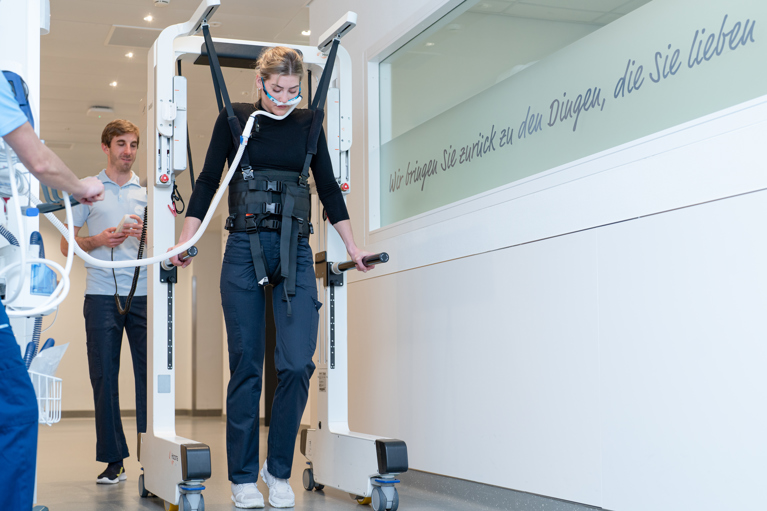
Neurological early rehabilitation
Early neurological rehabilitation, which begins after the patient is discharged from the acute care unit, allows the patient to practice everyday skills at an early stage, even though intensive medical monitoring and therapy are still required. We have extensive experience and expertise in early neurological rehabilitation. The Bodan Ward is specially designed for severely affected patients and offers the possibility of weaning them off the ventilator. It is located in the Heart-Neuro-Center Bodensee on the campus of the Kantonsspital Münsterlingen and works closely with the neighboring acute care hospitals.


